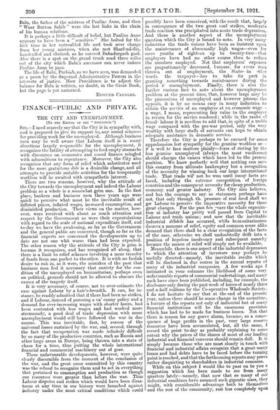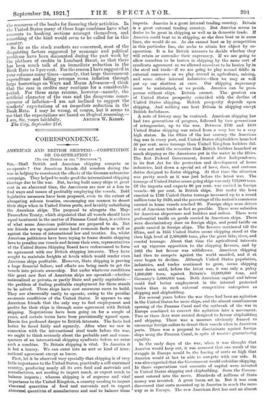FINANCE—PUBLIC AND PRIVATE.
THE CITY AND UNEMPLOYMENT.
[To THE EDITOR OP THE " SPECTATOR."] Sin,—I need scarcely say that the City is in sympathy with, and is prepared to give its support to, any sound schemes for providing work for the unemployed. Although business men may be well aware that Labour itself is in many directions largely responsible for the unemployment, it recognizes the futility of attempting to feed empty stomachs with discourses on economics and sound finance mingled with admonitions to repentance. Moreover, the City also recognizes that any form of relief which substitutes work for the mere gratuitous dole is a desirable change, and all attempts to provide suitable activities for the temporarily workless will be awaited with sympathetic interest. There are two reasons, however, why the attitude of the City towards the unemployment and indeed the Labour problem as a whole is a somewhat grim one. In the first place, bankers and business men three years ago were quick to perceive what must be the inevitable result of inflated prices, inflated wages, increased consumption, and diminished production. Their views on the matter, how- ever, were received with about as much attention and respect by the Government as were their expostulations with regard to the scale of national expenditure itself, and to-day we have the awakening, so far as the Government and the general public are concerned, though so far as the financial experts are concerned the developments up to date are not one whit worse than had been expected. The other reason why the attitude of the City is grim is because it recognizes, and has recognized all along, that there is a limit to relief schemes involving a mere transfer of funds from one pocket to the other. It is with no foolish desire to rub in, as it were, the mistakes of the past that business men feel it necessary that anxiety for the con- dition of the unemployed on humanitarian, perhaps even on political, grounds should not be allowed to obscure the causes of the tragedy itself.
It is very necessary, of course, not to over-estimate the case against Labour by a hair's-breadth. It can, for in- stance, be readily admitted that if there had been no strikes, and if Labour, instead of pursuing a ea' canny policy and a demand for ever-increasing wages with shorter hours, had been contented with less wages and had worked more strenuously, a good deal of trade depression with some unemployment would still have followed the war in due course. This was inevitable, first, by reason of the universal losses sustained by the war, and, second, through the fact that recuperation was made infinitely difficult by so many of the productive countries, such as Russia and other large areas in Europe, being thrown into a state of chaos for a time, thus putting the whole international financial and commercial machinery out of gear. These unfavourable developments, however, were quite clearly discernible from the moment of the conclusion of the war, and the great error committed by this country was the refusal to recognize them and to act in everything that pertained to consumption and production as though our resources were greater than before the war. Thus Labour disputes and strikes which would have been disas- trous at any time in our history were launched against industry under the most critical conditions which could possibly have been conceived, with the result that, largely in consequence of the two great coal strikes, moderate trade reaction was precipitated into acute trade depression. And there is another aspect of the unemployment question which the City is bound to note. In very many industries the trade unions have been so insistent upon the maintenance of abnormally high wages—even for mere youths of eighteen up to twenty-two—that employers have had no other course than to reduce the numbers employed. Not that employers' expenses are proportionately decreased, because, for every man thrown out of employment, the State--in other words. the taxpayer—has to take its part in granting something towards maintenance during the period unemployment. Finally, there is also the further curious fact to note about the unemployment problem at the present time, that, however large may be the processions of unemployed and however piteous the appeals, it is by no means easy in many industries to obtain the service of an employee at an economic wage--a wage, I mean, representing fair value to the employer in return for the service rendered ; while in the ranks of female labour it is needless to add that, in spite of a treble wage compared with the pre-war period, only the very wealthy with large staffs of servants can hope to obtain adequate assistance in domestic service.
Therefore the City is perhaps to be excused for some apprehension lest sympathy for the genuine workless or— it is well to face matters plainly—fears of rioting by the less genuine unemployed (always the most vociferous) should obscure the causes which have led to the present position. We knov perfectly well that nothing can save this country from ultimate bankruptcy but a recognition of the necessity for winning back our large international trade. That trade wily not be won until many facts are faced, including the extreme competition of foreign countries and the consequent necessity for cheap production, economy. and greater industry. The City also believes, and has the courage to say. as statesmen perhaps have not, that only through th. pressure of real need shall we get Labour to perceive the imperative necessity for these great changes. For the past few rears the whole organiza- tion of industry ha, pretty well passed from Capital to Labour and trade unions ; and now that the inevitable industrial debdcle has occurred, while humanitarianism decrees a measure of relief, equity and common sense alike demand that there shall be a clear recognition of the facts of the case, otherwise we shall undoubtedly drift into a position of hopeless insolvency and subsequent anarchy because the means of relief will'simply not be available.
Meanwhile, there is one aspect of the industrial depression to which the attention of investors may perhaps be usefully directed—namely, the inevitable results which will be disclosed in due course in the annual reports of many of the industrial companies. A few weeks ago I intimated in your columns the likelihood of some very unfavourable reports of commercial undertakings, and many such have since been published, including, for example, the disclosure only during the past week of losses of nearly three and a-half millions by the Co-operative Wholesale Society. I do not hesitate to say that at the end of the present year, unless there should be some change in the meantime, a feature of the reports not only of industrial but of many financial institutions will be the enormous provision which has had to be made for business losses. Not that there is reason for any grave alarm, because, as a conse- quence of huge profits in the past, very large reserve resources have been accumulated, but, all the same, record the point to-day as probably explaining to some extent why the prices of the shares of most of our leading industrial and financial concerns should remain dull. It is simply because those who are most closely in touch with financial and industrial affairs recognize that a great many losses and bad debts have to be faced before the turning point is reached, and that the forthcoming reports may prove rather disquieting to shareholders in industrial concerns. While on this subject I would like to pass on to you a suggestion which has been made to me from many quarters lately—namely, that now that so many of our industrial combines have assumed such gigantic sizes, they might, with considerable advantage both to themselves and the rest of the community, rest less completely upon the resources of the banks for financing their activities. In the United States many of these huge combines have what amounts to banking sections amongst themselves, and something of the kind would seem to be called for in this country. So far as the stock markets are concerned, most of the disquieting factors suggested by economic and political problems have been discounted during the past week by the plethora of credits in Lombard Street, so that there has been much talk of an immediate reduction in the Bank Rate to 5 per cent. For the reason I have suggested in your columns many times—namely, that large Government expenditure and falling revenue mean inflation through large borrowings on Ways and Means Advances —I think that the ease in credits may continue for a considerable period. For these same reasons, however—namely, the artificial character of the ease and the dangerous conse- quences of inflation—I am not inclined to support the markets expectations of an immediate reduction in the Bank Rate. I may be wrong, of course, but it seems to me that the expectations are based on illogical reasoning.—



































 Previous page
Previous page